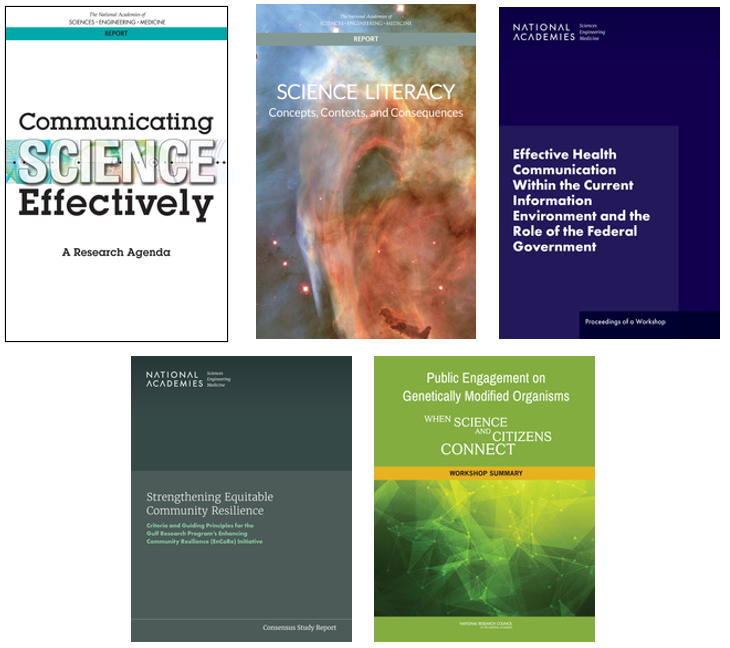
Over the last several years, the National Academies of Sciences, Engineering and Medicine has released several reports on science communication and literacy:
Communicating Science Effectively (2017)
Science and technology are embedded in virtually every aspect of modern life. As a result, people face an increasing need to integrate information from science with their personal values and other considerations as they make important life decisions about medical care, the safety of foods, what to do about climate change, and many other issues. Communicating science effectively, however, is a complex task and an acquired skill. Moreover, the approaches to communicating science that will be most effective for specific audiences and circumstances are not obvious. Fortunately, there is an expanding science base from diverse disciplines that can support science communicators in making these determinations.
Effective Health Communication Within the Current Information Environment and the Role of the Federal Government (2023)
On March 20 and 21, 2023, the Board on Science Education at the National Academies of Sciences, Engineering, and Medicine hosted a workshop titled Effective Health Communication within the Current Information Environment and the Role of the Federal Government. Workshop speakers and participants, a majority of whom were working in government agencies in federal health communication or leadership positions, joined both in person in Washington, D.C. as well as virtually to explore the current health information environment as it pertains to public trust and behavior change, explore how federal health agencies can communicate effectively within the current information environment and what is needed to support effective health communication moving forward. This publication summarizes the presentations and discussion of the workshop.
Science Literacy: Concepts, Contexts, and Consequences (2016)
Science is a way of knowing about the world. At once a process, a product, and an institution, science enables people to both engage in the construction of new knowledge as well as use information to achieve desired ends. Access to science—whether using knowledge or creating it—necessitates some level of familiarity with the enterprise and practice of science: we refer to this as science literacy.
Strengthening Equitable Community Resilience (2023)
The Gulf Research Program of the National Academies of Sciences, Engineering, and Medicine has developed a program to strengthen community resilience, the Enhancing Community Resilience (EnCoRe) initiative. EnCoRe aims to reduce inequities in health and community resilience; advance research and practice in health and community resilience; and build the capacity of communities for addressing the impacts of climate change and disasters on at-risk populations. To achieve these goals, EnCoRe will support long-term, multiyear community engagement projects that partner directly with select communities across the Gulf region and Alaska.
Public Engagement on Genetically Modified Organisms (2015)
The National Research Council's Roundtable on Public Interfaces of the Life Sciences held a 2-day workshop on January 15-16, 2015, in Washington, DC to explore the public interfaces between scientists and citizens in the context of genetically engineered (GE) organisms. The workshop presentations and discussions dealt with perspectives on scientific engagement in a world where science is interpreted through a variety of lenses, including cultural values and political dispositions, and with strategies based on evidence in social science to improve public conversation about controversial topics in science. The workshop focused on public perceptions and debates about genetically engineered plants and animals, commonly known as genetically modified organisms (GMOs), because the development and application of GMOs are heavily debated among some stakeholders, including scientists. For some applications of GMOs, the societal debate is so contentious that it can be difficult for members of the public, including policy-makers, to make decisions. Thus, although the workshop focused on issues related to public interfaces with the life science that apply to many science policy debates, the discussions are particularly relevant for anyone involved with the GMO debate. Public Engagement on Genetically Modified Organisms: When Science and Citizens Connect summarizes the presentations and discussion of the workshop.